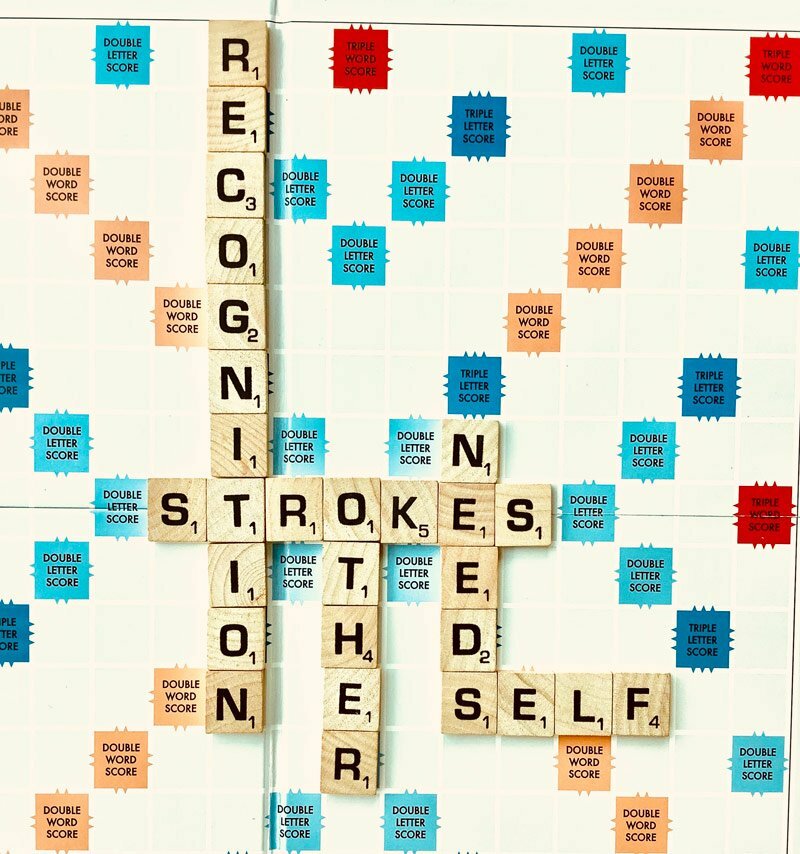
Globally we are experiencing challenging times, people may feel invisible as they remain isolated, discriminated against, separated from loved ones, restrictions placed upon them.
I want to share something with you that may seem simple in concept yet has a profound impact on our wellbeing and others. What I would like to share is a Transactional Analysis concept called the Stroke Economy, developed by the Psychotherapist Claude Steiner.
Let’s begin by looking at the meaning of the term “Stroke Economy”. A Stroke is another word for Recognition. When I say ‘Recognition’ I mean to be seen, acknowledged (positively/negatively), our existence to be validated. The word “Economy” refers to how we give and receive recognition, like giving and receiving money in the real economy.
I chose the concept of Recognition because in times of stress we may return to the way we used to think when we were children. For example, “The world can feel like a ‘scary place’, other people ‘will let me down’, I am ‘unlovable’”. As children we made decisions, not always consciously, on the best way to survive/relate to the world around us. We learnt how to deal with Recognition in childhood based on our relationships, our beliefs about ourselves, other people and the world.
Let me describe what the Stroke (Recognition) Economy is. It is a way of giving and receiving recognition of one another. However, as we grow up, we start to learn ‘rules’ from those around us on how this ‘economy’ works.
- Don’t give strokes/recognition when we have them to give
- Don’t ask for strokes/recognition when we need them
- Don’t accept strokes/recognition if we want them
- Don’t reject strokes/recognition when we don’t want them
- Don’t give ourselves strokes/recognition.
Recognition can be:
- Unconditional – about us as a person.
- Conditional – based on something we have done, e.g. work, or clothes we are wearing.
- Positive.
- Negative.
- Fake – start off really positive and end up with a negative bite to them.
- Marshmallow- they feel insincere, over the top.
Remember that how we receive and give them is how we see ourselves, other people and the world around us. We unconsciously filter these to fit our belief systems that we unconsciously created in our childhood.
Now that we understand how we give and receive recognition, there are a number of questions we can ask ourselves:
How are we at asking for what we need? This does not have to be a material thing, we could need some reassurance that we are doing a ‘good enough’ job, that our grades are okay, we look okay, we are asking for recognition, to be validated.
Will we ask for what we want, or do we feel uncomfortable? If we do ask, then receive what we asked for, do we accept it or feel it was only given because we asked, therefore rejecting the very thing we asked for?
If we ask for what we need and the other cannot provide what we need, do we then see this as reinforcing our belief that we should not ask for what we want. Another way is that perhaps that person cannot meet our needs, yet there is someone else that can. Can we see how we start those repetitive patterns of relating with others?
If we see someone and want to give them recognition, are we able to tell them? If we feel uncomfortable doing this, consider reflecting on what stops us from doing it?
If someone gives us a negative stroke/recognition, “I don’t think you should do it that way” do we accept this, reject it or enter into a constructive conversation about it?
Do we give ourselves strokes/recognition? Do we recognise our achievements, do we acknowledge if we look good, have done something we are proud of, tackled a difficult situation and had a satisfactory outcome?
I would like to share something from my own experience with you. I was preparing for an oral exam where I presented my work. One piece of advice I was given was, “if the energy is low in the room there is probably a lack of strokes/recognition”, this was both ways, was I acknowledging and giving recognition to the board, were they giving it back to me?
Is the energy low in your home, at work, in friendship groups?
We may think we are being selfish or self-centred if we ask for what we need. But if we don’t, how do others know what we need. Perhaps our partners need to know they are okay, and if we start giving recognition, we may notice we start to receive more too?
Have we noticed within ourselves discomfort when people recognise us? Do we brush them off, or minimise them? Which of the Stroke Economy rules are we following?
I am sure we have heard of the following analogies:
1) On the airplane, in the case of an emergency place your own oxygen mask on first in order to help others.
2) We cannot make calls from our mobile if our battery needs recharging.
3) We cannot pour from an empty cup.
If our ‘Stroke/Recognition banks’ are empty, our energy may feel low, our relationships may be impacted. We are waiting for others to ‘read our minds’, to simply ‘know what we need’.
Looking at the idea of recognition, from the perspective of only ever having received positive strokes as a child or at work, we may not have a realistic view of the world. On the other hand, negative strokes can be a way of learning, but they can also be harmful. As a child if I run in to the road and my father rebukes my behaviour, I will learn from this. But, if I am told I am not okay, not good enough, then this negative stroke can impact my self-esteem. Equally, any Stroke/Recognition is better than no Recognition so you may experience children/adults seeking out negative strokes as a way of recognition, as a way of validating their existence. These repetitive patterns of behaviour in adulthood can lead to difficulties within relationships.
How can we start to change how we relate to others and ourselves?
We can start to challenge our own belief system. We can look for ways that we can give positive strokes and start to foster a mindset of appreciation towards others. Think about the intent behind the gestures.
Adrienne Lee a Psychotherapist and Transactional Analyst suggests that:
- We do give strokes/recognition when we have them to give.
- Do ask for the strokes/recognition we want.
- Do accept the strokes/recognition we want.
- Do reject the strokes/recognition that we don’t want.
- Do give ourselves strokes.
Let us think about our own Stroke/Recognition Profile (McKenna, 1974):
On a scale of “Always, Very Frequently, Frequently, Often, Seldom, Never”
- How often do we give positive/negative strokes/recognition to others?
- How often do we take/accept positive/negative Strokes/recognition?
- How often do we ask others for positive/negative strokes/recognition? (directly or indirectly)
- How often do we refuse to give positive/negative strokes/recognition others expect?
In essence the concept of the Stroke Economy may seem simple, however it has a profound impact on our wellbeing and impacts how we relate to ourselves and others.
References
Gilbert, M. and Shmukler,D. (1996). Brief Therapy with Couples, An Integrative Approach. Chichester, Wiley.
Lee, A. (1997) in Widdowson, M. (2015). Transactional Analysis for Depression: A step-by-Step Treatment Manual. London Routledge.
McKenna, J., (1974). Stroking Profile. Transactional Analysis Journal, 4(4), pp.20-4
Steiner, C. (1971). The Stroke Economy. Transactional Analysis Journal, 1(3), pp.9-15.

